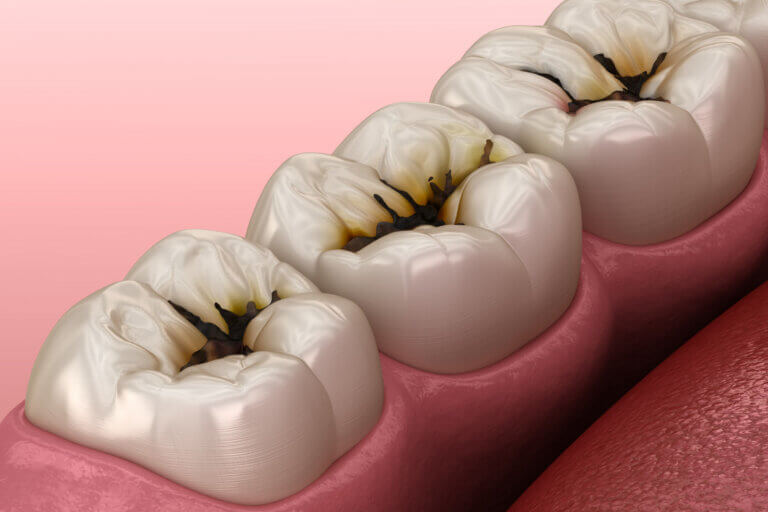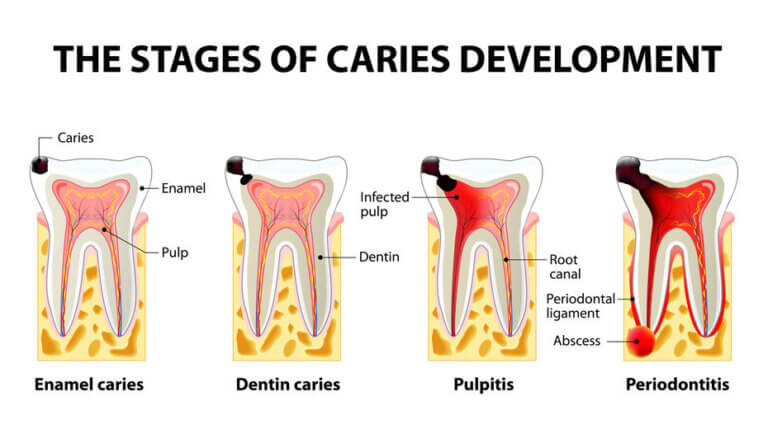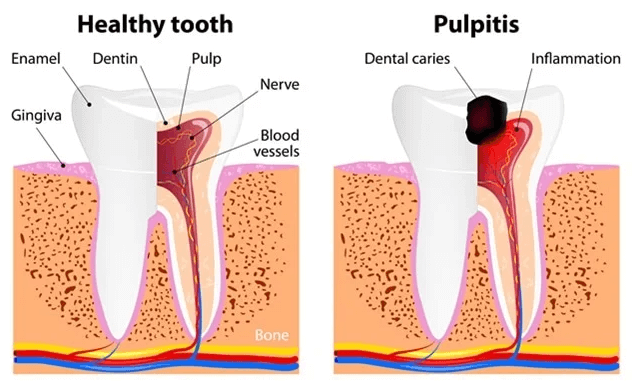Irreversible Pulpitis

What Is Irreversible Pulpitis?
Irreversible pulpitis is a condition where the dental pulp—the innermost part of the tooth containing nerves and blood vessels—becomes severely inflamed and infected. Unlike reversible pulpitis, where the pulp can heal with appropriate treatment, irreversible pulpitis causes persistent, throbbing pain that won’t subside on its own. Treatment typically involves removing the infected pulp via root canal therapy or, in severe cases, extracting the tooth.
Before you contact a Toronto dentist to examine Irreversible Pulpitis, there are some things you should know as a patient:
- Why Do I Have Irreversible Pulpitis?
- Signs And Symptoms Of Irreversible Pulpitis
- Treatment Options For Irreversible Pulpitis
- Managing Irreversible Pulpitis Until You Can See The Dentist
- Frequently Asked Questions About Irreversible Pulpitis
If you have questions about Irreversible Pulpitis or other dental problems, please contact us for more information.
Why Do I Have Irreversible Pulpitis?
Several factors can lead to irreversible pulpitis, including:
- Untreated Cavities: When cavities are left untreated, bacteria penetrate deeper into the tooth, reaching the dentin and pulp, which can result in severe inflammation and infection.
- Extensive Dental Procedures: Teeth that have undergone repeated dental work, such as large fillings or crowns, may become vulnerable. These procedures can irritate the pulp, leading to inflammation.
- Dental Trauma: An injury that damages the tooth structure or disrupts blood flow to the pulp can trigger pulpitis. Trauma may result from accidents, sports injuries, or biting hard objects.
If you suspect you have irreversible pulpitis, it’s essential to seek prompt dental care. A Toronto dentist can assess your symptoms and recommend the most suitable treatment. For more information about Irreversible Pulpitis, please contact us.

Signs And Symptoms Of Irreversible Pulpitis
Identifying the symptoms of irreversible pulpitis early can help you seek timely treatment and prevent complications. Common signs include:
Spontaneous Toothache: The pain often appears suddenly and may feel intense and sharp, occurring without an obvious trigger.
Prolonged Pain: Pain that lingers even after exposure to heat (and sometimes cold) is a key indicator of irreversible pulpitis.
Difficulty Locating the Pain Source: Many people with pulpitis find it challenging to pinpoint the affected tooth, sometimes mistaking the pain as originating from other areas in the mouth.
Sensitivity to Pressure and Tooth Elevation: As the infection spreads, the affected tooth may feel tender when chewing or biting and might feel “high” in the bite due to a periapical abscess.
If you’re experiencing any of these symptoms, it’s essential to consult a dentist for proper diagnosis and treatment. For more information about Irreversible Pulpitis, please contact us.
Treatment Options For Irreversible Pulpitis
When diagnosed with irreversible pulpitis, treatment focuses on alleviating pain, removing infected tissue, and preserving the tooth if possible. The primary treatment options are:
- Root Canal Therapy: A root canal is often the best option to relieve pain and save the tooth. The procedure involves removing the infected pulp, cleaning the root canals, and filling them with a material called gutta-percha. Afterward, a filling and a crown may be necessary to reinforce the tooth.
- Tooth Extraction: If the damage is too severe for a root canal, tooth extraction might be the only option. Replacement options after extraction include dental implants, bridges, or dentures.
- Antibiotics: In cases of widespread infection, antibiotics may be prescribed to control bacterial spread. This is especially important if there are signs of systemic infection, such as fever.
Your dentist will discuss these options with you and recommend the best course of action based on the extent of damage and your overall oral health. For more information about Irreversible Pulpitis, please contact us.

Managing Irreversible Pulpitis Until You Can See The Dentist
While you await professional dental treatment, here are some strategies to temporarily manage pain from irreversible pulpitis:
Over-the-Counter Pain Relievers: Medications like ibuprofen (Advil) or acetaminophen (Tylenol) can help manage pain. Always follow dosing instructions or consult your dentist for recommendations.
Cold Compress: Applying a cold compress to your cheek near the affected area can reduce inflammation and numb the pain temporarily.
Avoid Trigger Foods: Steer clear of hot, cold, or sugary foods that may worsen pain. Stick to soft, lukewarm foods to minimize discomfort.
Elevate Your Head: Keeping your head elevated while sleeping can reduce blood flow to the affected tooth, which may help reduce pain.
Saltwater Rinse: Rinsing with warm saltwater can help reduce bacteria and soothe irritated tissue. Mix one teaspoon of salt in a cup of warm water, swish for 30 seconds, and spit.
Maintain Good Oral Hygiene: Brush and floss gently around the affected area to keep it clean and reduce irritation. Using a soft-bristled toothbrush may help minimize further discomfort.
These methods provide temporary relief but are not substitutes for professional dental care. Make sure to schedule an appointment as soon as possible. For more information about Irreversible Pulpitis, please contact us.
Frequently Asked Questions About Irreversible Pulpitis
- Can irreversible pulpitis go away on its own?
No, irreversible pulpitis will not improve without treatment. Once the pulp is damaged beyond repair, intervention is necessary to alleviate pain and prevent further complications.
- How long can I delay treatment for irreversible pulpitis?
Delaying treatment can lead to increased pain, infection, and potential tooth loss. Seeking prompt care from a dental professional is essential to manage symptoms and preserve your oral health.
- Will I need antibiotics for irreversible pulpitis?
Antibiotics may be prescribed if the infection has spread beyond the tooth or if you exhibit systemic symptoms like fever. However, antibiotics alone will not cure irreversible pulpitis.
- What is the success rate of root canal therapy for irreversible pulpitis?
Root canal therapy has a high success rate, typically around 90-95%, when performed by an experienced professional.
Irreversible pulpitis is a serious dental condition that requires prompt treatment to relieve pain and prevent further complications. For more information about Irreversible Pulpitis, please contact us.

